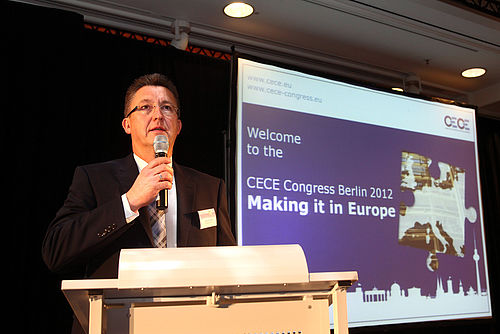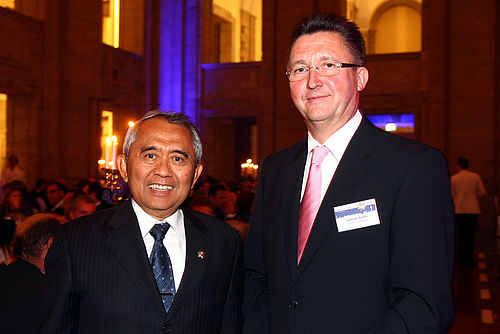CECE Congress in Berlin: “Making it in Europe”
Under the slogan of “Making it in Europe” representatives of the European construction equipment sector met in Berlin from 24 to 26 October. The participants were provided with an excellent calibre program.

The Committee for European Construction Equipment (CECE) is the umbrella organisation of the European construction equipment associations and is based in Brussels. Most of the members tend to be small and medium-sized enterprises but large European and multi-national companies with production sites in Europe are also represented by the CECE. The CECE represents about 1,200 companies from 13 countries who together generate revenues of about EUR 24 billion and employ 130,000 people. The objective is to create fair competition conditions by means of harmonised standards and rules.
GEDA Managing Director Johann Sailer invited members to Berlin
Within the framework of the CECE Congress, representatives of the European construction equipment industry, partners and customers meet every two years to exchange ideas and experiences. This year's congress took place in Berlin since Germany, represented by Johann Sailer (51), is the president of the CECE.
Mr Sailer runs the medium-sized company GEDA-Dechentreiter GmbH & Co.KG which is based in Asbach-Bäumenheim, Bavaria, Germany. Over the last eight decades, GEDA has developed into a leading worldwide manufacturer of construction and industrial hoists. Johann Sailer has held the office of CECE President since 1 January 2012. It is important to him, through a strong representation of the sector, to help secure Germany as a production location in the European market and also to give a voice to Germany's many medium-sized companies.
Big challenges for the sector
The demand for construction equipment is increasingly moving to other parts of the world, Chinese competition is entering the market and in short, the European economy is at a crossroads. The construction equipment sector is committed to retaining Europe as a production location so that it can continue to offer its customers high-quality products. Added to this is a huge skills shortage of specialist personnel and where it is becoming more and more difficult for small and medium-sized companies to obtain well-qualified specialist staff.
Outside of Europe the sector is mainly concerned about the weak Chinese market. Construction equipment revenues in China have fallen by 40% in the first half of the year and will probably report a decline of 25% at the end of the year. Due to these developments it is to be expected that Chinese competition will become more prominent in the European market.
With such difficult, yet exciting challenges in the back of attendees' minds, the slogan of this year's CECE Congress was “Making it in Europe.”
 |
High-calibre speakers
These topics were also covered in the numerous technical presentations given as part of the Congress. Johann Sailer welcomed the representatives of the construction equipment industry and gave a presentation which looked at the current skills shortage problem. Selected speakers from the global business environment discussed in their subsequent contributions the development of the construction equipment sector over the last few years and ventured the first forecasts for the economic outlook in Europe. Environmental and sustainability aspects were also discussed. The strengthening of Europe as a production site always remained a focal point.
Johann Sailer pointed out the market supervision obligation of the CECE and compliance to the corresponding guidelines. “Precisely in relation to the dramatic revenue fall in the Chinese market, the strengthening of the European construction equipment industry must continue to be our prime objective. Development, production and service should remain in one location in order to remain competitive and above all to secure jobs in Europe” was Johann Sailer's challenge to the CECE members.
In the press conference on 26 October Sailer and other sector experts informed the attending journalists of the latest economic data from the construction equipment industry.
A sector with good prospects
The CECE Congress aims, through strong collaboration, to play its part in equipping companies in the construction equipment sector for the future. Despite all the challenges the agreed outlook was positive and a study published recently by the European Commission concluded that the European construction equipment sector is in a good competitive position and has positive growth prospects. European Engineering and European products will therefore continue to be in demand in world markets.




 Download as PDF
Download as PDF Print page
Print page